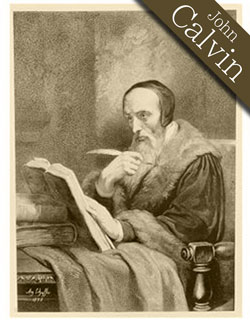John Calvin
The weight, beauty and comfort of the Gospel
Recently I came across a stunning preface John Calvin
wrote for Pierre Robert Olivétan’s French translation of the New
Testament (1534). To my knowledge the

English translation of this preface is found only in Joseph Haroutunian’s work,
Calvin: Commentaries
[a strange place to find it since this preface is not part of the
commentaries]. Anyways, in it Calvin traces out the biblical storyline
and the Messianic promises throughout Scripture, shows the supernatural
unity of the bible’s message and the significance of the gospel message
revealed in Scripture. He writes,
“Without the gospel everything is useless and vain;
without the gospel we are not Christians; without the gospel all riches
is poverty, all wisdom folly before God; strength is weakness, and all
the justice of man is under the condemnation of God. But by the
knowledge of the gospel we are made children of God, brothers of Jesus
Christ, fellow townsmen with the saints, citizens of the Kingdom of
Heaven, heirs of God with Jesus Christ, by whom the poor are made rich,
the weak strong, the fools wise, the sinner justified, the desolate
comforted, the doubting sure, and slaves free. It is the power of God
for the salvation of all those who believe …” (66)
Because of the weight of this gospel revealed in Scripture, it’s no
surprise that Calvin closes this preface with words for preachers: “O
you who call yourselves bishops and pastors of the poor people, see to
it that the sheep of Jesus Christ are not deprived of their proper
pasture; and that it is not prohibited and forbidden that any Christian
feely and in his own language to read, handle, and hear this holy
gospel…” (72).
These two quotes – one on the centrality of the gospel and the second
on the importance of preaching – really reveal the heart of John Calvin
as a man riveted to the Cross.
But I was especially struck by the following section where Calvin
shows us that all the Christian’s comfort and hope rests in the person
and work of Jesus Christ. He writes,
“It follows that every good thing we could think or
desire is to be found in this same Jesus Christ alone. For, he was sold,
to buy us back; captive, to deliver us; condemned, to absolve us; he
was made a curse for our blessing, sin offering for our righteousness;
marred that we may be made fair; he died for our life; so that by him
fury is made gentle, wrath appeased, darkness turned into light, fear
reassured, despisal despised, debt canceled, labor lightened, sadness
made merry, misfortune made fortunate, difficulty easy, disorder
ordered, division united, ignominy ennobled, rebellion subjected,
intimidation intimidated, ambush uncovered, assaults assailed, force
forced back, combat combated, war warred against, vengeance avenged,
torment tormented, damnation damned, the abyss sunk into the abyss, hell
transfixed, death dead, mortality made immortal. In short, mercy has
swallowed up all misery, and goodness all misfortune. For all these
things which were to be the weapons of the devil in his battle against
us, and the sting of death to pierce us, are turned for us into
exercises which we can turn to our profit. If we are able to boast with
the apostle, saying, O hell, where is thy victory? O death, where is thy
sting? it is because by the Spirit of Christ promised to the elect, we
live no longer, but Christ lives in us; and we are by the same Spirit
seated among those who are in heaven, so that for us the world is no
more, even while our conversation [life] is in it; but we are content in
all things, whether country, place, condition, clothing, meat, and all
such things. And we are comforted in tribulation, joyful in sorrow,
glorying under vituperation [verbal abuse], abounding in poverty, warmed
in our nakedness, patient amongst evils, living in death. This is what
we should in short seek in the whole of Scripture: truly to know Jesus
Christ, and the infinite riches that are comprised in him and are
offered to us by him from God the Father.” (69-70)
These are beautiful words! The introduction as a whole is a
masterpiece, taking the reader from the biblical storyline and the
Messianic promises to the gospel itself, showing that our eternal life
and present comforts rest in Christ alone. Then he finishes with an
exhortation that preachers be diligent to proclaim this Word.
It is good for us to remember the grace of God in revealing His Word
to ungrateful truth-suppressors and and illuminating His Word to blind
sinners. Let us remember that, “Without the gospel everything is useless
and vain” and let us study Scripture seeking to “truly to know Jesus
Christ, and the infinite riches that are comprised in him and are
offered to us by him from God the Father.”
So how do you persuade the French people towards Reformation
theology? You point them to Scripture and specifically to the complete
and perfect work of Jesus Christ on the Cross. Calvin persuaded masses
because his message was Scripture-saturated, grace-filled, and
Cross-centered. The gospel was everything! With this in mind, French
readers could read right into Matthew and the rest of the New Testament
on a quest to see Christ’s glory for themselves.

 English translation of this preface is found only in Joseph Haroutunian’s work,
English translation of this preface is found only in Joseph Haroutunian’s work,